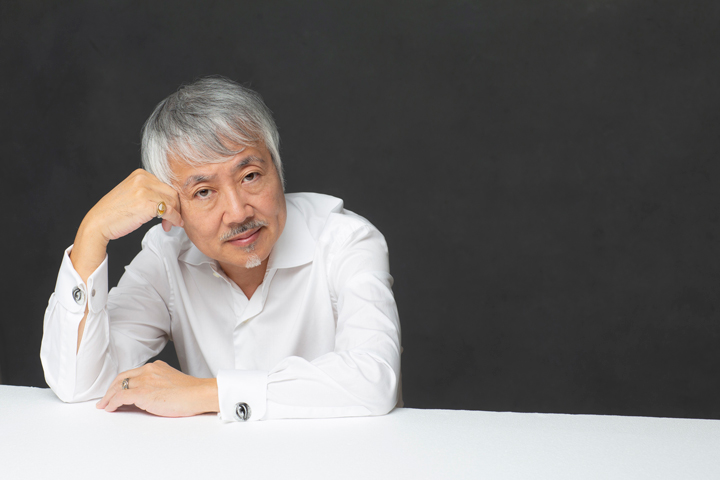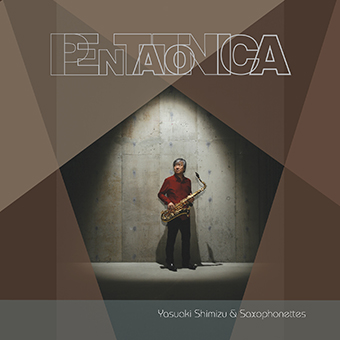CONTACT
YASUAKI SHIMIZU
PENTATONICA
PENTATONICA
ペンタトニカ
-
1Dolomiti Spring (ドロミティ・スプリング) Dolomiti Spring
-
2Hibi no Awa (日々の泡) Hibi no Awa
-
3Hattorun (はっとるん) Hattorun
-
4Tokyo Taboo (トウキョウ・タブー) Tokyo Taboo
-
5Atame (アタメ) Atame
-
6Pentatonica (ペンタトニカ) Pentatonica
-
7Dolomiti Spring - solo (ドロミティ・スプリング - ソロ) Dolomiti Spring (solo)
-
8Yoitokosassa (よいとこさっさ) Yoitokosassa
-
9Hoho Jugatsu (ほほ・じゅうがつ) Hoho Jugatsu
-
10Tèw Semagn Hagèré (テュ・セマン・ハゲレ) Tèw Semagn HagèréTèw Semagn Hagèré
テュ・セマン・ハゲレ
エチオピア伝統曲/詞:清水靖晃
ああからからのカナリアったら
風と肌の隙間でんでん
うたうかれてたとかえりのはなが咲くツンドラ
足音旅に出たんだら
息でなみ書きながらんらら
冷たい春のしわからしわまでほんだら
おおまたとびでしわからしわまでほんだら
うちけす影のおとんとん
すこしずれてうなるんるる
はりさけそうではりさけないふりしたツンドラ
よびかけたけどこたえのないふりしたほんだら
思いたって背伸びんびん
月の裏が見たい
ここまできたら十億年たってもほんだら
むかしのしるしさがしてみたけどツンドラ
砂になった気持ちったら
水になった気持ちったら
ここでなにかおこるんるる
とまどっても丸裸
はなればなれの心と体がツンドラ
細胞の先の電子にまとわりつくほんだら
明日のない昨日
前の駅から未来
つくりばなしはやめてったら
オタマジャクシもやめてったら
にじんだふたりひとつになってもこれほんだら
うたたねしてたあいだのできごとこれツンドラ
釣り合うポジとネガ
高く足をあげてんてん
無用のプラカード
不意に訪ねてごめん
筒になった気持ち
音になった気持ち
砂漠のノイズ持ち帰ってきたけどツンドラ
砂から耳へ耳から砂へとそれほんだら
青になった気持ち
泡になった気持ち
えらいぞぼうずの気持ち
夢に出てきた気持ち
ちりになった気持ち
歌うたいたい気持ち
はりさけそうではりさけないふりしたツンドラ
よびかけたけどこたえのないふりしたほんだら
-
11Kiwa (きわ) Kiwa
-
12Koega (コエガ) Koega
-
13Endeneh Belulegn (エンデンネ・ベルレンニュ) Endeneh Belulegn
-
14Sarasa (さらさ) Sarasa
-
15Hiru (ひる) Hiru
サキソフォネッツが到達した、はかなく、懐かしく、グラマラスで、官能的な5音音階
NHK教育テレビ、「マテマティカ2」テーマ曲、「よいとこさっさ」収録
Shimizu swan-dives into the magical, sensuous realm of the pentatonic scale, venturing through the wonderlands of the musical scale that forms the foundation of so many ancient songs of Africa, Europe, Asia and the Americas. From the pirouetting rhythms of the modern-dance inspired “Dolomiti Spring,” to the shimmering, stoic beauty of “Hattorun,” or the gently teasing vocal track “Tèw Semagn Hagèré,” Shimizu and his all-saxophone band transcend every limitation of genre in this dynamic and profoundly original journey.
-
神秘と野蛮
エティオピア音楽にインスパイアされたペンタトニック(5音階)な音楽と、通常の欧米型ポップ・ミュージックで用いる7音階の音楽を一緒にやる。そんなアイデアを最初に清水靖晃から聞かされたのは2年ほど前だったと思う。いや、両者を混ぜ合わせるのではなく、交互にやるということだったかもしれない。いずれにしても、90年代にテナー・サックスによるバッハ作品のソロ・パフォーマンスで喝采を浴びた清水が、今度は、ペンタトニック・モードにも挑戦するということだけでも、十分に話題になるとその時は思った。おまけに今度は、ソロではなく若手サックス・プレイヤー4人を加えたクインテット・スタイルだというし。 しかし僕は、大きな期待と同時に、若干の危惧も抱いていた。主にアジアやアフリカなど非西洋圏の大衆音楽(もちろん日本の演歌も含む)で用いられるペンタトニック・モードを、万能のサックス・プレイヤー清水靖晃が演奏したからといって、物珍しさからくる驚きや笑い以外に何か新しいものが生まれるのだろうか。あるいは、西洋(7音階)と非西洋(5音階)という、いわば水と油のような関係にある二つの世界を強引に隣接させる荒業は、確かにスリリングではあるけど、僕が清水に求めるのは、そのもっと先にある世界なのだ…と、そんな思いがあったのだ。 が、果たして上がってきた新作の音を聴いて、僕は唸った。これは、危惧を抱きつつ予想していたものとは違う。5音階と7音階を強引に並べたものではないし、また、ペンタトニック・モード全開ではあるけど、それは単にエティオピア音楽をなぞったものでもない。怪しいメロディがクネクネうねるペンタトニック・モードの楽曲の随所には、バッハに象徴される西洋音楽の対位法的身振りも垣間見えるし、12音技法的なアンハーモニックな響きもあったりする。もっと言えば、クール・ジャズやボサ・ノヴァまで包括した遠大なパースペクティヴを感じさせるのだ。7音階とか5音階とか、あるいは西洋と非西洋とか、そんなことなどはもうどうでもいい、宇宙的とでも言いたくなるような新しいハーモニーと瑞々しい音響が達成されている。あのバッハ作品集でつかんだサックスの新しい表現技法、音響的マジックが、ここでは着実に深化しているのだ。 実は、この完成盤を聴くまでに、僕はリハや録音を見学し、またライヴ(06年9月、六本木スーパーデラックス)も体験しているのだが、それらで得た印象とも、ここにある音は違う。 「リハにリハを重ねて、5人の音のバランスを考え、僕の頭の中で聴こえる音を目指してきた。吹く時のイントネーションを、自分のヴィジョンまでもっていった。皆で吹きながらここまで変わっていったというのは、マライア以来久しぶりですね」 そう清水自身も語るように、この極めてデリケートで玄妙な世界に到達するまでには、かなりの鍛錬が必要だったようだ。サキソフォネッツの新しい4人のメンバーの力量も讃えられるべきだろう。90年代にバッハ作品をコンサートで演奏していたメンバーに比べ、今回の新メンバーには、テクニックもさることながら、より柔軟なセンスが求められたはずだ。彼らは全員が東京藝術大学の出身者、つまりバリバリにアカデミックな場で修行を積んできた者たちだが、4人中3人はチャンチキトルネエドの、2人は東京中低域のメンバーでもあることからもわかるように、非西洋音楽、大衆音楽に対してもフラットなスタンスをもっている。 「今一緒にやっている4人のサキソフォン奏者は、僕のやりたいことを本当に真面目に分かろうとしてくれる。リハーサルがこんなに楽しく次が待ち遠しかったのはマライア以来だ。今回は久しぶりにライヴをたくさんやりたい」と意欲を見せる清水。 思い起こせば、清水がペンタトニックな音楽、非西洋的音楽に対するただならぬ関心を顕にしたのは、最近のことではない。既に80年代初頭のマライアや『案山子』他のソロ作品でもそういう傾向は見せていたし、ヒップなアレンジと演奏で演歌ファンを戸惑わせた北島三郎の「漁歌」も、83年だった。 清水によると、そうした背景には、幼少時の音楽体験が深く影響しているという。熱狂的なアマチュア音楽家でもあった彼の父親は、自分でバンドを作り、様々な楽器を演奏したり作曲したりしていたという。そんな父親に連れられて、清水も幼い頃からダンスホールやキャバレーに出入りし、大人に混じって演奏していた。時は60年代初頭。クラシック、ラテンにジャズ、歌謡曲に民謡と、東西の様々な音楽がチャンポンになった当時の日本ならではのアナーキーな空間におけるこの濃密な体験こそが、彼の表現の根幹にはある。そういう意味では、この新作は、彼のキャリアにおいてとても意味のある作品であり、また、彼でなくては作れなかったものでもある。 ただの受け狙いだったら、エチィオピア音楽をそのままガツンとコピーしたり、あるいは、エティオピア音楽とバッハを交互に入れる方がわかりやすかったのかもしれない。しかし彼はそうしなかった。というか、彼にはできなかった。なぜなら、彼はDJ(編集者/リプレゼンター)ではなく、とことん音楽家だから。 神秘と野蛮が一体化したこの新しい音響空間が、今後、世界中でどのようなエコーを広げていくのか、誰にもわからない。
松山 晋也
-
“穏やかでいてスリリングなサキソフォンたちの戯れ。
まるで音符が空間を浮遊してゆくような、
まるで旋律が時間を漂流してゆくような、
音楽と演奏の真にマジカルな達成が、ここにはある。”(HEADZ 佐々木敦)
“エチオピアの伝統音楽って日本の民謡みたい。清水靖晃は数年前からエチオピアの旋律をサックス合奏のために編曲してぼくらを仰天させたが、今度はその先に跳んでいる。『ペンタトニカ』を聴くと、アフリカ大陸東北部と日本列島の東北部が空間のよじれでつながってしまった空想の国、エチオ・ニッポニアに迷い込んだかのようだ。首都は恵比寿アベバ、元国王は灰田セラシエ、マラソン・コーチは安部兵衛(あべべえ)。タイトル曲「ペンタトニカ」はらくだ引きの馬子唄、「トウキョウ・タブー」はナイトクラブのオリエンタル・オンド・ダンサーのお気に入り、「よいとこさっさ」は三橋美智也の持ち歌、ナンセンスなまじない歌に化けた「テュ・セマン・ハゲレ」は実はコプト教の御詠歌。この瞬間移動で、砂漠は森になり、音の湿度が上がった。こういう湿り気のある残響、いいねえ。サキソフォネッツもコブシを出せるようになって、二重丸。やれ、それ、ほんだららー。”
(音楽評論家 細川周平)
“スペイシーな空間にサックスの音が浮遊している。
その透明かつ深遠な感じ…
清水靖晃がサキソフォネッツと創り出した音楽は、どのジャンルにも属さず、またうまく言葉で説明できる類いのものでもない。
でも、それがかけがえのない魅力を持ったものであることは間違いない。
この新作で僕は前以上に深く遠いところまで連れていかれてしまった。”(プロデューサー 立川直樹)
“やわらかくて、あったかくて、懐かしい響きにしばし時を忘れました。”
(音楽評論家 北中正和)
“五音音階、6/8拍子、黒魔術的な雰囲気で世界中の音楽好事家や音楽家を虜にしたエチオピア音楽。「暗黒河内音頭」とでも呼びたいその奇妙な音楽性に、近年バッハをテーマにしたサックス作品を作り続けていた清水靖晃が反応した。新生サキソフォネッツが描き出すのは、5本のサックスによる五音音階の対位がもたらすヨーロッパ~東アフリカ~日本のノーマンズ・ランド!”
(よろずエキゾ風物ライター サラーム海上)
-
Mystery and savage sentence: to do together and Matsuyama Shinya Ethiopia pentatonic (5 scale), which is inspired by the music of music, the 7 scale music to be used in the usual Western-type pop music. I think it was about two years ago had heard such a idea from the beginning to Yasuaki Shimizu. No, rather than mix the two, it might was to be that do alternately. In any case, Shimizu that drew applause in the solo performance of Bach works by tenor sax in the 1990s, it is now, even just the fact that also challenge the pentatonic mode, at that time I thought when fully become topic . Omakeni This time, to say that quintet style plus four young sax player rather than a solo. But I, at the same time high expectations and had also embraced some of the fear. Mainly the pentatonic modes used in the popular music of non-Western bloc, such as Asia and Africa (of course also including Japan Enka), just because Yasuaki sax player Shimizu universal is played, surprise and laughter coming from the novelty something I wonder if the new one is born to non. Or, that the West (7 scale) and non-Western (5 scale), so to speak Arawaza to adjacent assertive two of the world that are in a relationship, such as water and oil, but certainly there is a thrilling, What I seek to Shimizu It is, and the more ahead’s a world which is in …, but there was a such a thought. But, listening to the sound of the new work that has really gone up, I growled. This is different from what you had expected while holding the fear. 5 scale and 7 to not were forcibly lined the scale, also, I there in the pentatonic mode fully open, it is not intended simply traced the Ethiopia music. The everywhere of suspicious melody of Kunekune undulating pentatonic mode music, to glimpse even contrapuntal gesture of Western music, which is symbolized by Bach, or there is also 12-tone technique specific Ann harmonic sound. Speaking more, and he feel the far-reaching Perspective was comprehensive to cool jazz and bossa nova. 7 Toka Toka scale 5 scale, or Toka Western and non-Western, such a thing is good, even if the other such as, a new harmony with the lush sound like want to say, even with the cosmic have been achieved. New representation technique of sax that grabbed at that Bach Works, acoustic magic, we now are steadily deepening. In fact, sound by the time listen to this complete panel, I will visit the rehearsal and recording, also live (September 06, Roppongi Super Deluxe), but also he is experiencing, which is also the impression obtained in them, here I different. By overlapping the rehearsal to “rehearsal, I think the balance of five of sound, has been aimed at sound hear in my head. Intonation when blows were performed with up to his vision. So far, while blowing in everyone because it went changed, even as talk since it is after a long time “so Shimizu own Mariah, to until it reaches the Genmyo world in this extremely delicate, seems to have needed a considerable amount of discipline. Competence of the new four members of Saxophonettes will also should be praised. Compared Bach work to members that had been played in concert in the 1990s, in this time of new members, technique Besides the, should more flexible sense was required. They are graduates of all the Tokyo National University of Fine Arts and Music, in other words but those who have gained training in the academic field in crisp, the three of four Chang Chiqui Torne Ed, that the two people is also a member of the low-pass in Tokyo As can be seen from the non-western music, and have a flat stance against popular music. “Now four saxophone players are doing together, is it since Mariah’s to us to try to find really serious that you want to do me. Rehearsal was so fun following Machidoshika~tsu. This time I want to do a lot of live for the first time in a long time “and show a willingness Shimizu. The Recall if, Shimizu pentatonic music, was to reveal the extraordinary interest in non-Western music, it is not a recent thing. To was also already in the early 80s Mariah and “Scarecrow” other solo show is kind of trend, “Ryouta” also Saburo Kitajima of which were puzzled Enka fans and playing hip arrangements, was in ’83. According to Shimizu, in such a background, that childhood music experience has been deeply affected. Enthusiastic amateur had his father also a musician, it is that she made a band, had been or composer you can play various musical instruments. By being brought to such a father, and out of the dance hall or cabaret from an early Shimizu also young, I was playing in mixed adult. When the early ’60s. Classical, jazz to Latin, and folk songs to pop songs, this what dense experience in Japan unique anarchic space of time in which various music of East and West became Champon is, there is the foundation of his expression. In that sense, this new work is his work very meaningful in the carrier, also, there is also one did not make is not he a. Once was just a received aim, you can as it is kick ass and copy the Echi~iopia music, or, perhaps was easy to see that those who put alternately Ethiopia music and Bach. But he did not. I mean, I could not him. Because, he DJ (editor / Li presenter) instead, because it is thoroughly musician. This new acoustic space that mystery and barbarism are integrated is the future, what kind of echo the go whether to expand, do not know anyone in the world.
-
“The play of thrilling saxophone who is have a calm.
Note though is like slide into floating space,
Like melody is like slide into drifting the time,
Truly magical achievement of music and playing, there is here. “
(HEADZ Atsushi Sasaki)“What of Ethiopian traditional music Japan folk songs like. Yasuaki Shimizu has been allowed to astound us by arrangement for saxophone ensemble Ethiopia of melody from a few years ago, now are jumping on the first.” Pentatonika If you listen to “, the African continent northeast and the Japanese archipelago fancy of the country in which Northeast has got connected by kinking of the space, it’s as if he wandered into Ethiopia-Nipponia. capital Ebisu Ababa, the original King Haida Selassie, Marathon coach Hyoe Abe (Abebee). Title song “Pentatonika” the camel pulling of Mago song, “Tokyo taboo” of the Oriental, temperature, and dancers of night club favorite, “good Toko Sassa” is michiya mihashi song has of, it was garbled nonsense curse song “Te~yu-Seman, Hagere” is actually Coptic of Goeika. In this moment move, desert becomes a forest, the humidity of the sound went up. Reverberation with such damp, Iine. Saxophonettes be made to let out a fist, and a double circle. Yare, it, Hondara-ra. “
(Music critic Hosokawa Shuhei)The sound of the saxophone are floating in “spacey space.
The clear and profound feeling …
Music Yasuaki Shimizu has created a Saxophonettes, how not belong to the genre, nor those of the kind physician can be explained by the well words.
But, no doubt that this is what it is with the irreplaceable charm.
In this new work I had been Ika brought far deeper and far more than before. “
(Producer Naoki Tachikawa)“In soft, warm, the Forgotten time to nostalgic sound often.”
(Music critic North and Central Masakazu)“Pentatonic scale, 6/8 time signature, in black magic atmosphere in Ethiopia music was captivated the music dilettante and musicians around the world. I want to call” dark Kawachi Ondo “and even the strange music, the Bach theme in recent years Yasuaki Shimizu, which has been making the sax work that you have reacted. Shinsei Saxophonettes that depict in Europe – East Africa – Japan’s No Man’s Land to bring a pair position of the pentatonic scale by five sax! “
(Yorozu Exotic scenery writer Salam Maritime)
プロデューサー: 清水靖晃、リサ・スキアヴォン
作曲:清水靖晃、エチオピア伝統曲 (10, 13)を除く
清水靖晃:テナーサキソフォン、ソロ(7, 12, 14)、ヴォーカル(10)
江川良子、林田祐和:テナーサキソフォン、ソプラノサキソフォン (5)
鈴木広志、東涼太:バリトンサキソフォン
レコーディング: 叶眞司
ミキシング:清水靖晃
ディショナル・ミキシング:叶 眞司
録音場所:コア石響(東京)、BankART Studio NYK (横浜)
ミキシングスタジオ:サブマリン、パスウェイ(東京)
Produced by Yasuaki Shimizu, Lisa Schiavon
Composed by Yasuaki Shimizu, Ethiopian traditional (10, 13)
Yasuaki Shimizu: tenor saxophone on all tracks, solo (7, 11, 14), vocals (10)
Ryoko Egawa, Hirokazu Hayashida: tenor, soprano (5) saxophone
Hiroshi Suzuki, Ryota Higashi: baritone saxophone
Recorded by Shinji Kano at Core Syakkyo (Tokyo), BankART Studio NYK (Yokohama)
Mixed by Yasuaki Shimizu at Submarine, Shinji Kano at Pathway (Tokyo)

